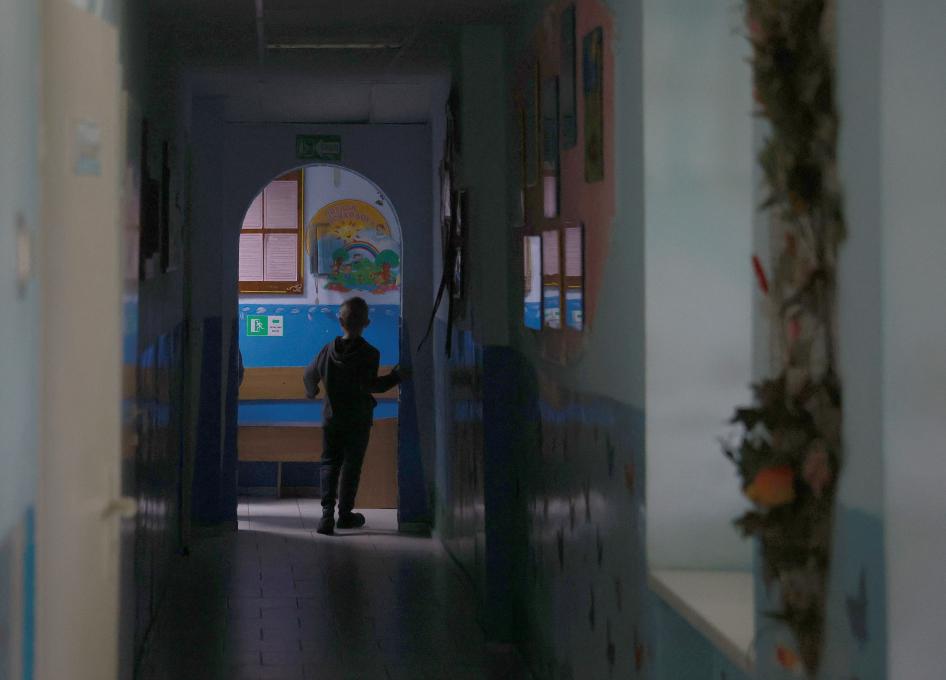(London) – Officials and business leaders at the Ukraine Recovery Conference, in London on June 21-22, 2023, should ensure that any “Marshal Plan” for the war-ravaged country includes ensuring children are not separated from their families and shutting down its network of 700 state-run children’s institutions, Disability Rights International, Hope and Homes for Children, Human Rights Watch, and Lumos said today.
Even amid the brutal conflict, the Ukrainian government has rightly pledged to ensure “the right of every child to live in a family.” The groups called on Ukraine and its partners to implement key recommendations for the needed care-system reforms, issued on June 14, by 16 organizations with expertise in child protection, disability inclusion, and human rights. Replacing Ukraine’s institutional care system, a Soviet-era legacy, with modern social services that strengthen families to help keep them together and that keep children out of institutions, should be central to rebuilding plans, the groups said.
Russia’s invasion of Ukraine has been devastating for children, with recent reports highlighting the grave risks and human rights violations experienced by children in residential institutions. As of February 2022, before the full-scale invasion, Ukraine had one of the highest rates of child institutionalization in the world, despite the fact that over 90 percent of these children had a living parent. War in this country has intensified some of the leading drivers for family separation and child institutionalization: poverty, disability, and conflict.
Mark Waddington, CEO of Hope and Homes for Children, said: “There’s a hidden humanitarian crisis playing out in Ukraine, where millions of families are displaced, social services are in tatters, unemployment is growing, food prices are rocketing, daily air raids are the norm, and trauma from Russian occupation is widespread. As a result, many parents are struggling to cope, and thousands of children are at risk of being placed in harmful institutions. Now, at a time of war, children need loving and comforting families more than ever. The Ukraine Recovery Conference offers an incredible opportunity to talk about physical reconstruction of buildings, roads, and infrastructure, but it must also address social reconstruction that directly serves families and children. This must include a commitment to closing every last children’s institution in Ukraine, and creating a modern care system that helps to keep families together. Families are the future of Ukraine, and leaders at the recovery conference must not ignore this.”
Peter McDermott, CEO at Lumos, said: “The coming together of Ukraine and key partners at this Recovery Conference marks a crucial moment for the international community to build the foundations for and take significant steps towards a future where Ukrainian children are not trapped in orphanages, but where families are equipped with the resources and community services they need to take care of children where they belong: at home.”
Eric Rosenthal, executive director of Disability Rights International, said: “With massive international aid being channeled toward Ukraine, we call on donors to prioritize family inclusion of children with disabilities and ensure meaningful participation of persons with disabilities and their representative organizations in all aspects of funding, policy making, and program development and implementation.”
Bill Van Esveld, associate children’s rights director at Human Rights Watch, said: “Russia’s invasion of Ukraine has exacerbated the harm faced by institutionalized children, and there’s no time to waste. Supporting Ukraine’s recovery means supporting reforms to protect every Ukrainian child’s right to live in a family and a community.”
The 16 groups, with years of experience working in Ukraine, provided specific recommendations to the Ukrainian government, its international partners, and the European Union in particular, to realize the right of all children in Ukraine to family and community life, free from the harm, neglect, and abuse that are common practice in institutions:
- Ukraine should establish a single national strategy that fully transforms the care system and end the use of residential institutions for all children, including children with disabilities.
- Donors and international partners should dedicate long-term funding to this reform strategy, prioritize funding to develop inclusive, family- and community-based care services, and prohibit funding to institutions.
The EU accession process for Ukraine gives the EU a crucial role as a champion and catalyst for care reform for children in Ukraine, the groups said. The prospect of Ukraine becoming an EU Member means that it is poised to unlock unprecedented attention, resources, and technical assistance to ensure the country transitions from an institutional to a family- and community-based care system. It is the international donor community’s role to support Ukraine’s care reform efforts and conform to EU accession requirements, the co-signatories concluded.







